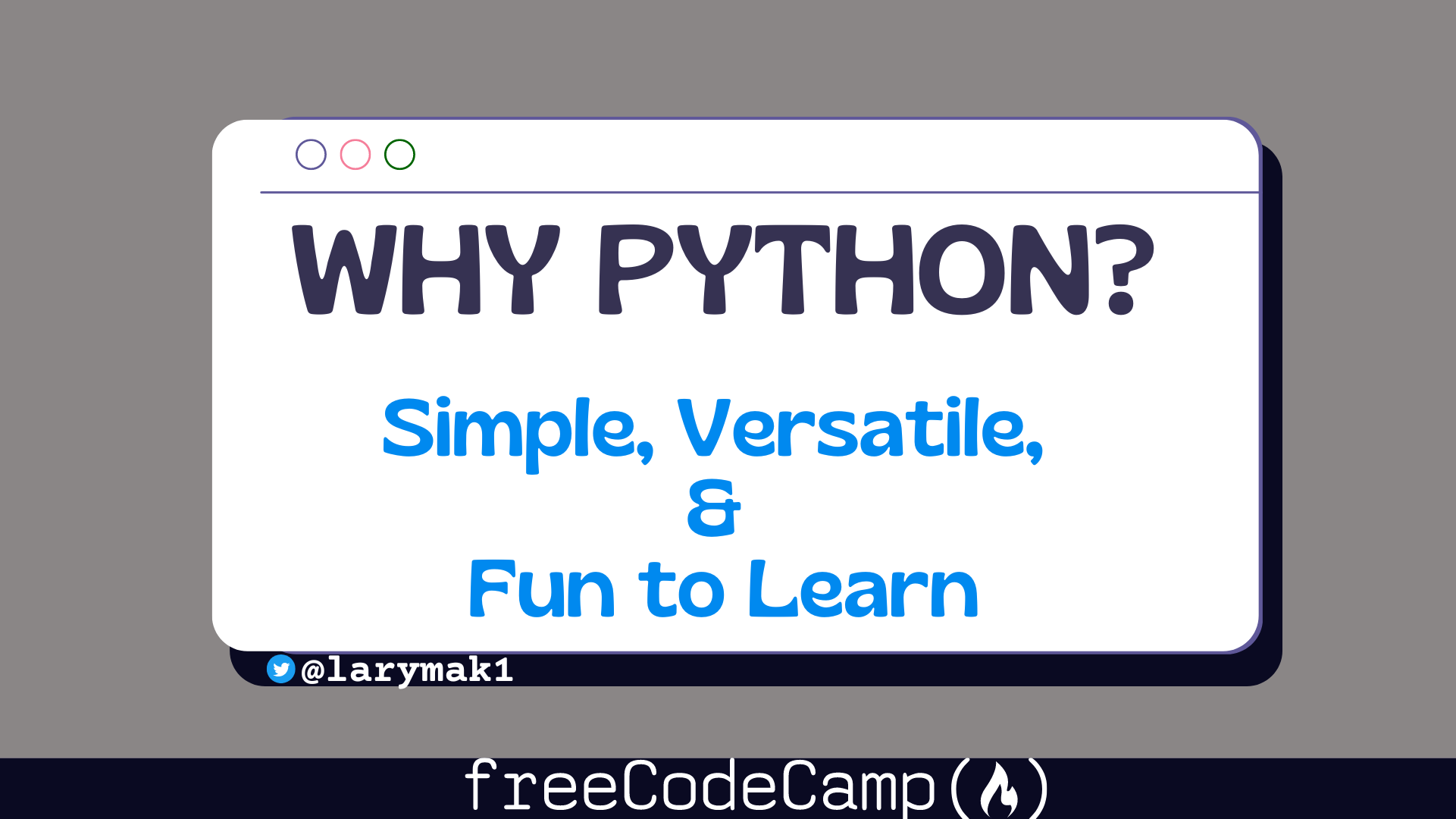Python is a programming language that has relatively simple syntax. This makes it an ideal choice for beginners who are just starting out in the field of programming.
Python is also a very versatile language, which means that you can use i for a wide variety of tasks and in different industries.
Just like most newbies trying to get into tech, I had difficulties finding the correct path of learning to code. I had to bounce back on forth trying to find a way that was comfortable for me.
I began my journey into the tech field by learning first the basics of web development – that is HTML, CSS and a little bit of JavaScript. Later on I tried out different programming languages, all in the name of trying to find the one that suited me perfectly.
I did a little bit of C and Java, and I even learned Pascal at some point (basically because it was what was being taught at school as a freshman).
All this was before I came across Python, gave it a try, learned a little bit about it, and decided that it would be my new normal.
Read along to get a better understanding why Python is the easiest language to learn for beginners, its benefits, and resources and tips to help you get started.
Why Learn Python?
Whether you are beginner or a person who has learned a couple of programming languages, you will likely agree that learning a new programming language can be challenging. Even more so when you don't have the right resources and guidance. But with the right help, you can make it an enjoyable experience.
Python was created on December 3, 1989 by Guido van Rossum. He had a design philosophy which stated, "There's only one way to do it, and that's why it works".
Python is an interpreted, high-level, general-purpose programming language. As a programming language, Python uses mostly English keywords, so it has fewer exceptions and special cases compared to the languages.
Now let's look at some of the reasons you might want to learn Python.
Python's Simple Syntax
Python is a language that has a very simple syntax. This is one of the reasons it is ideal for beginners getting into tech to consider as a first language. I understand this alone might not be motivating enough, but believe me – after a thorough breakdown you will be convinced otherwise.
Compared to other languages, Python has one of the simplest syntaxes that uses fewer lines of code to accomplish a particular task. This makes it easier to learn the basics and understand the language within a shorter period of time.
In addition to this, Python is an interpreted language, which means that you don’t need a compiler to write and run Python code.
Let's take an example where we print the "Hello World" statement using Python, Java, and C++:
Here's "Hello World" in Python:
print("Hello World)Here it is in Java:
public class HelloWorld {
public static void main(String[] args) {
System.out.println("Hello, world!");
}
}And here it is in C++:
#include <iostream>
using namespace std;
int main() {
cout << "Hello, world!" << endl;
return 0;
}As you can see from the code snippets above, Python has the most concise and easiest syntax compared to the others.
Python's Versatility
This is one of the reasons why Python is such a popular language. No matter what field you are in, one way or the other you'll probably be able to use Python in your work and personal projects.
For instance:
- Industrial Applications – Python is used in a wide range of fields including web development, data science, machine learning, artificial intelligence, scientific computing, and more. Recently its impact has really been felt in the fields of AI and ML, making it a high demand skill to have.
- Frameworks and Libraries – Python has a large collection of frameworks and libraries, all of which make it easier to use while creating applications and help you develop projects in a shorter period of time.
- Compatibility – Python is a cross platform language, meaning code that is written in one OS can be executed in another OS without any issues. This is mostly useful for developers working on web projects who would like to test the project functionality on multiple devices.
- Open-Source – One of the reason why I actually like Python is that it has a vibrant open-source community. This helps make many resources available to those who want to learn and contribute to the language. Also this makes Python an evolving language that is always getting better and better.
Benefits of Learning Python as a New Developer
As a beginner getting into tech, learning Python will have lots of benefits. In addition to what we just discussed, here are some more:
Popularity in various industries
Python is used in many industries such as web development, data science, artificial intelligence, finance, education, research, security and many more.
Having Python knowledge and skills can open doors to various career opportunities such as Software Engineer, DevOps Engineer, Data Scientist, Research Analyst and more, giving you an edge in the job market.
Practicality
If you're comfortable with Python, you'll be able to put those skills to good use, solving real world problems.
With its wide variety of libraries and frameworks you will be able to develop applications and systems that can help predict outcomes, visualize data, and understand different trends. Python's also very good at helping you automate tasks.
Community and Support
The Python community provides many resources to help first timers learn. These resources include online tutorials, forums, coding challenges, courses, and more.
freeCodeCamp even offers a Python curriculum which you can check out here.
This kind of support can help a newcomer get motivated and engaged as they try to build their career.
Tips for Learning Python
While Python is a great first language to learn, that doesn't make it a walk in the park. You'll want to take the necessary steps and find the right tools to help you along your learning path.
First of all, having the right resources is a good start, and a roadmap can be very helpful.
For this you won't have to struggle much: roadmap.sh is an open-source project that has roadmaps and guides to different career paths, including Python.
With this understanding of how to study in mind, now we can proceed to the resources to help you achieve your learning goals.
Resources for Learning Python
There are a variety of resources to learn Python, some of which are paid and some of which are free.
- For step-by-step lessons that are interactive check out platforms like: Codecademy, W3Schools, Pythontutorial.net, Python.org, Google's Python Class, and Educative.
- For fully facilitated courses check out platforms like: freeCodeCamp, Udemy, Coursera, edX, Programiz, Microsoft's Introduction to Python Course
Another important thing to note is that writing code is essential to mastering Python – the more you practice the better you become.
Build projects is a great way to help improve your understanding of the language. Start with small projects and gradually work you way up to more complex projects.
To get you started, here's a list of Python projects you can check out.
Also, try learning in public. You can do this by participating in online communities and social media through sharing what you know and answering questions. For example, you can participate in #100DaysofCode on Twitter, or commit to some other challenge. In return you'll be able to get answers to questions you have.
As you learn, keep in mind that understanding the fundamentals of programming such as data types, functions, and control structures is very important before diving into advanced topics.
And as an aspiring Python developer, learning how to debug your code is crucial for your success as a developer. So make sure you learn and master the tricks at an early stage.
How to Stay Motivated
As the saying goes:
Learning is a lifelong journey.
There will always be something new to learn each and every day. And staying motivated will help you go a long way. Here is some advice to keep you going.
- Set achievable goals – having an achievable goal is important as it will help you stay motivated. For example you can set a goal of writing a simple program that does something each day.
- Celebrate small wins along the way – this will keep you encouraged and eager to achieve more.
- Find a mentor, study buddy or join a study group – this will help you learn from others, and remember to take breaks when necessary.
- Lastly, remember that learning takes time and patience. Don't get discouraged if you don't understand a concept right away. Keep practicing and you'll get there.
Conclusion
In this guide, I've highlighted some main reasons why you should consider Python as you first language. You have also seen Python's different applications and what you can do with it.
To help you get started, I would highly encourage you to take advantages of all resources available – both those listed here and others available online (including books) to get a better understanding of the language.

